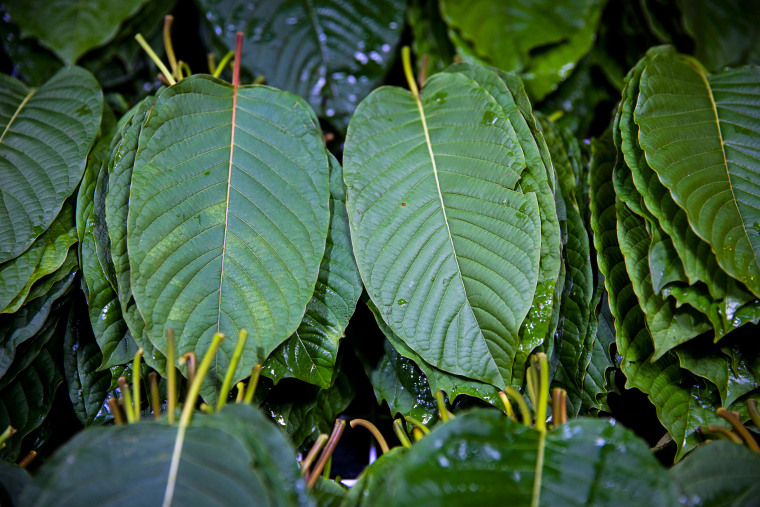The Food and Drug Administration on Tuesday recommended classifying 7-OH, a compound with opioid-like effects found in unregulated tablets, gummies and drink mixes sold in gas stations and convenience stores, as an illicit substance.
Such a move by the Justice Department would restrict or prohibit access to the products, which are also currently sold online.
The chemical, formally known as 7-hydroxymitragynine, is often marketed as a way to help people relax, relieve pain or improve their mood or focus. But studies suggest it’s more potent than morphine, and the FDA has warned it could damage the heart or liver and potentially lead to seizures, digestive issues, shallow breathing, withdrawal symptoms or even death.
“We’ve seen a disturbing rise in reports of overdoses, poisonings and emergency room visits linked to products containing 7-OH,” Jim O’Neill, deputy secretary of the U.S. Department of Health and Human Services, said at a press conference Tuesday.
He said 7-OH products are often sold without warnings or control over the quality or dosage.
“This is a recipe for public health disaster,” O’Neill said.
7-OH is found naturally in the leaves of a tropical evergreen tree. An herbal extract made from those leaves, known as kratom, is also sold as an unregulated dietary supplement. Kratom products contain trace amounts of 7-OH, whereas products sold under the name “7-OH” contain a synthetic, concentrated version of the chemical, according to the FDA. Sometimes, 7-OH products are misleadingly marketed as kratom.

The FDA’s recommendation Tuesday will trigger a review from the Drug Enforcement Administration, the branch of the Justice Department responsible for classifying drugs as controlled substances. There are five potential classifications, corresponding to varying degrees of regulation. They’re based on a substance’s medical use, public health risks and potential for abuse.
FDA Commissioner Martin Makary said Tuesday that the FDA is recommending that 7-OH be classified as a Schedule I substance, meaning it has no accepted medical use and a high potential for abuse. Other drugs in that class include heroin, marijuana and ecstasy.
The FDA currently warns people not to use kratom products due to the risk of serious side effects such as seizures and liver toxicity, and because it may lead to substance use disorder.
The DEA in 2016 said it planned to regulate the active ingredients in kratom, including 7-OH, as Schedule I substances. But the agency nixed the effort after considerable pushback from kratom advocates. Around 1.9 million people ages 12 and up in the U.S. reported using kratom in 2022, according to the National Survey on Drug Use and Health.
Tom Prevoznik, an assistant administrator at the DEA, said at Tuesday’s press conference that the public will again have an opportunity to comment before a final decision is made.
“DEA will do what we’ve always done: follow science, follow the law and do what’s right to keep our community safe,” he said.
Health and Human Services Secretary Robert F. Kennedy Jr. recalled the availability of heroin fueling his own addiction decades ago, and expressed concern about the widespread distribution of 7-OH products near schools, military reservations and in low-income neighborhoods in the United States.
He added that 7-OH products are “marketed for children. They’re gummy bears, they’re bright colors, they’re candy flavored. This is really a sinister, sinister industry.”
The FDA issued warning letters in late June to seven companies, which it said were illegally marketing products containing 7-OH. According to the agency, the chemical cannot be lawfully added to conventional foods or dietary supplements because there is not enough information to demonstrate its safety.
Dietary supplements don’t require FDA approval to be sold or purchased, but the agency mandates that companies that manufacture, package, label or store supplements test their ingredients and limit contamination. It’s up to the FDA to test products and determine whether they’re unsafe before the agency can remove them from the market.
Makary said Tuesday that the FDA is focused on 7-OH rather than kratom, noting that the agency’s recommendation distinguishes trace amounts of 7-OH from synthetic, concentrated amounts.
“We are going after the killer first,” he said.
The Holistic Alternative Recovery Trust, which advocates for the use of plant-based compounds to address opioid addiction, said the FDA’s recommendation Tuesday disregards how 7-OH is used in the real world.
“If 7-OH posed the kind of urgent danger that would justify emergency action, evidence would have been presented. It was not,” Jeff Smith, the group’s national policy director, said in a statement.
Proponents of kratom say it’s useful for pain management and can help people with substance use disorders wean off more dangerous opioids.
The American Kratom Association, which advocates on behalf of kratom users, has said it’s not opposed to the FDA regulating kratom products via labels, age restrictions or limiting the concentration of 7-OH. However, it maintains that kratom does not have a high potential for abuse or warrant classification as a controlled substance.
Source link